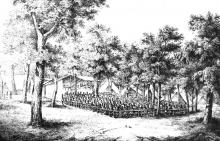Summer visitors play a large part in Vineyard activity and many who have spent summer after summer on the Island feel as deep an affection and admiration for Martha’s Vineyard as any all year-round resident. For forty-five summers Frank C. Lawton has spent at least part of every year in Oak Bluffs and, although his first arrival on the Island was at the age of six months, he recalls many interesting facts about the Vineyard’s earlier history, that occurred during his boyhood.
Mr. Lawton’s great grandfather was one of the first Oak Bluffs visitors, and his grandfather, William B. Lawton, was one of the first officers of the camp meeting association. The Lawton cottage at 70 Trinity Park was built in the year 1859 and was the first to be erected in the tent village. Here Mr. Lawton’s father passed many pleasant vacations and here Mr. Lawton and his son, Frank C. Lawton Jr., spent their childhood.
When Mr. Lawton was a boy, most of the houses now standing in the camp ground were already built. However, a stout iron railing formerly encircled the tabernacle ground’s circle of land. It was his boyhood delight to swing and turn somersaults on this railing, and perhaps the neighborhood lads’ exercise had something to do with the removal of the railing some twenty-five years ago. Another form of gymnastics for the youth of a past decade was that of bicycle racing. The boys would arduously pump their wheels up the hill on New York avenue above Lake Anthony and then, lined up like so many eager racehorses, with a one, two, three, the bikes were off. The lucky lad who managed to coast the farthest down the hill and around Dukes County avenue was the winner of the contest. The record for these coasting expeditions was established at Captain Dias’ Hotel near the present site of the Sanitary Laundry.

Another sport offered for the boys’ enjoyment was roque. This game was far more popular in Mr. Lawton’s younger days than the well-loved croquet, and on Waban Park there were eight good roque courts. Later Mr. Lawton can remember that croquet reached unheard of peaks of fame and even distracted the greatest minds of the Vineyard. Several of the ministers of the camp grounds became so engrossed in the wicket game that they were late to the services and were severely reprimanded for their negligence. Rev. Benjamin F. Kidder endorses Mr. Lawton’s statement that croquet was more beloved than any game today. He remembers the time when the first person to put the wickets out in the morning had the right to use the croquet grounds for the day. As early as 1 a. m. Dr. Kidder raced to the grounds only to find an even more anxious playrer holding the fort against all comers.
However, more serious occupations took up the greater part of Mr. Lawton’s vacations. For several summers he sold five cent bars of popcorn, not the famous Darling variety, as that store was not then in existence, but manufactured on the present Darling site and at a stand near the camp grounds.
From selling epicurean delights Mr. Lawton turned to the vending of newspapers. The papers were purchased at the office of the Martha’s Vineyard Herald on the Wigwam site and the boys were allowed a cent a paper as their wage. In a voice that was rapidly changing from piping boyishness to manly bass, young Lawton ballyhooed in best of newsboy style. “Boston, Providence, and New Bedford morning papers,” was shrieked at the passerby in a rising, breathless salute. The New Yorker, yearning for the noises of his native heath, could make himself feel quite at home by listening to Mr. Lawton’s Broadway technique. No longer do the newsboys emulate their predecessor’s noble example and the dyed-in-the-wool city man has to go many a mile to hear a really energetic newsboy of the old school. Mr. Lawton was highly successful for those days, as he frequently made as much as thirty or forty cents a morning.
Began Lifelong Friendship
Even when Mr. Lawton returned to his home, in Providence his connection with the Vineyard was not severed. At the Peace Street Grammar School, he met Charlie Vanderhoop and the two boys began a friendship that has lasted throughout their lives. Charlie lived in Gay Head and in those days the road was only passable as far as West Tisbury. Frank Lawton couldn’t run up to Gay Head in an hour and see friend Charlie, but he did take the boat excursion from Oak Bluffs to Gay Head. At the boat landing an ox-cart met the passengers to take them to the Head and much to Frank’s delight, the driver of the cumbersome vehicle was young Vanderhoop. In this way the two boys occasionally saw each other and today the families are fast friends.
When Mr. Lawton was older he followed the custom of the other Island courtiers and drove young ladies to West Tisbury on thrilling excursions. His wife remembers how momentous these occasions were and how delightful the chocolates shaped like animals used to taste. These confections were the prime reasons for the long trip to West Tisbury and probably deserve as high a rank in the weapons of Cupid as the proverbial arrows.
The young people had fine swimming parties at the Highland beach, and the boardwalk that led from Oak Bluffs to the beach was a popular place for promenading. Although these diversions may not seem the height of excitement to the present generation, perhaps they offered enough amusement to keep the Island from being overpopulated with the pseudo-bored youth that overruns the Vineyard today. However, Mr. Lawton still has firm faith in the younger generation and he especially delights in the fact that the same friendly family circle feeling still pervades the atmosphere of the tabernacle. As in his boyhood days friendly greetings salute him from every porch of the circle and in his son, Frank Jr.’s group of young friends, Mr. Lawton sees a mere repetition of the gala spirit of the lads of his day. Change has not been very great in the past forty-five years here and, although Mr. Lawton says more people came to the BluffS for religious purposes in the old days, at present the summer vacationists support the tabernacle loyally and young people lustily join in the community sings: Camp-meeting days may have passed their zenith but camp-meeting families still are as firmly attached to the Vineyard as ever and the Lawton representatives of the fourth and fifth generations are by no means exceptions. “Vineyard summer days for our family forever” might well be the slogan of these sturdy descendants of Cottage City founders.








Comments